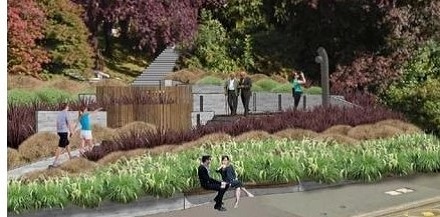Archive News & Announcements - 2021
[SHARE] China to aid Kiribati in developing Fiji land
Feb 2021 - News
Kiribati has announced plans to work with China in developing a huge piece of land on the Fijian island of Vanua Levu. The five-and-a-half thousand acre estate was purchased in 2014 as a place for Kiribati citizens to relocate if their islands became uninhabitable due to climate change. Local reaction to the news has been mixed but Former Kiribati President Anote Tong said he was in favour of the land being developed. "The question really is would China be a partner that I would choose... I did not choose China in 2003 I chose Taiwan," He said. "What the current government is doing it may be an option... Fiji [has] had some problems with the developments the Chinese private sector have been involved in." For more, listen to Pacific Beat. Duration: 5min 45secBroadcast: Tue 23 Feb 2021, 6:00am Image: TGN1/Flickr
Toda Director interview on Conscientious Objector Memorial
Feb 2021 - News
Toda Peace Institute Director, Professor Kevin Clements, is also the Chair of the Archibald Baxter Memorial Trust. The development of a memorial to Baxter and other conscientious objectors has begun in Dunedin, New Zealand, and it is hoped it will be opened on 15 May, International Conscientious Objectors Day. In this interview with Radio New Zealand, Professor Clements discusses the significance of project, and the role of conscientious objectors in expanding civil liberties and enlarging the space for individuals to express their disobedience to the state when their consciences say that state is taking the wrong course.
Online Symposium “Examining Norms and Regulations for Emerging-Technology Weapons: From the Perspectives of Security, Human Rights and Humanitarian Considerations”
Feb 2021 - News
On 19 December 2020, the Toda Peace Institute and Platform for Security and Emerging Technologies (PSET) co-organised an online symposium under the title “Examining Norms and Regulations for Emerging-Technology Weapons: From the Perspectives of Security, Human Rights and Humanitarian Considerations”. The innovative format included a panel of speakers who gathered at the Toda Peace Institute in Tokyo, with some 100 participants joining online via Zoom and YouTube. The symposium was conducted in Japanese. Moderated by Professor Tatsujiro Suzuki from Nagasaki University, the panel was made up of keynote speaker Ambassador Nobushige Takamizawa, Ms. Kanae Doi from Human Rights Watch and Kimiaki Kawai from Toda Peace Institute, joined by Professor Tomohiro Inagaki from Hiroshima University. The participants were government officials, experts, civil society activists, and graduate students. All speakers presented different perspectives, trying to address the issues of Lethal Autonomous Weapons Systems (LAWS) from multiple angles. Ambassador Takamizawa explained how the government of Japan has been working on highlighting focal topics including the definition, lethality, meaningful human control, the scope of regulations, the relationship with international law and ethics, and confidence-building measures, reviewing the past discussions on international processes. Ms. Doi, a human rights expert, argued why the LAWS should be prohibited, highlighting the key elements of a ban treaty introduced in the latest report “New Weapons, Proven Precedent: Elements of and Models for a Treaty on Killer Robots,” published in October 2020 by Human Rights Watch and International Human Rights Clinic at Harvard Law School. Mr. Kawai argued that the challenge posed in the face of the rapid pace of innovation of military technologies is to address the questions about what may happen, triggered by a new military technology in a risk society today, while Humanitarian Law addresses the questions about what has already happened in armed conflict. As a scientist, Professor Inagaki commented that it is necessary to look at risks in both civil and military use of technologies, also referring to its complicity since a risk is sometimes hard to measure. Aiming to facilitate dialogue between civil society and policy makers, the symposium attracted positive feedback both from speakers and participants. The format of an online symposium was an effective way to reach the many interested participants, particularly during the Covid-19 pandemic. A detailed report on the symposium will be published at a later date. The recording of the online symposium can be found at: https://youtu.be/rWG2ybb6aH4 (The event was conducted in Japanese)


